Overall Vista Performance: XP vs. Vista vs. Vista x64
Benchmarking in Vista is an extremely difficult task, thanks to features like SuperFetch designed to improve performance at the sacrifice of repeatability. We're in love with SuperFetch as a feature, but it does make our jobs a bit more difficult as we have to be very mindful of what has been cached into main memory and how that impacts the performance of our benchmarks. Testing difficulties under Vista are compounded by the fact that our major test suites don't work under the new OS. SYSMark and PC WorldBench simply won't run and thus we have to rely on individual application tests and home-brew scripts to measure performance.
Our goal for this article was to find out if Windows Vista, on modern day hardware, continues to be slower than Windows XP as it has been in previous beta and RC versions. The secondary goal is to look at x64 performance to see if it too has changed behavior, to the point where you no longer need to worry about losing 32-bit performance if you move to the 64-bit version of Vista. We ran a handful of application tests to compare the three OSes (XP, Vista and Vista x64), and later on we'll focus on gaming tests as well to showcase graphics performance.
PCMark '05 Performance
Despite looking quite synthetic, PCMark has grown into a nice lightweight alternative to the big application suite benchmarks like SYSMark. It was also one of the first benchmarks to get official Vista support, although it remains a 32-bit only test.
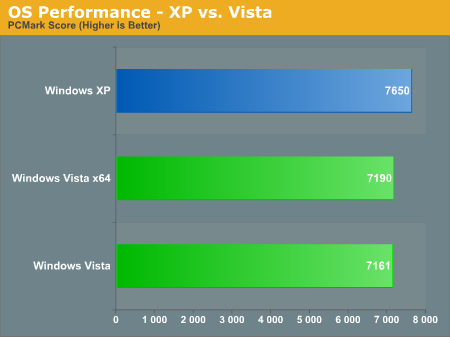
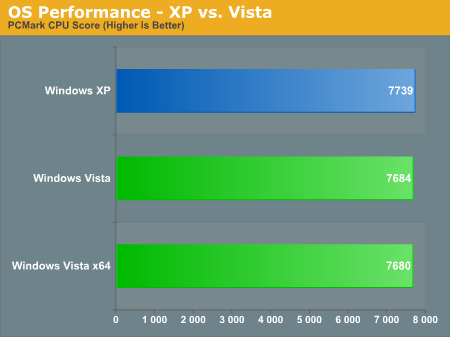
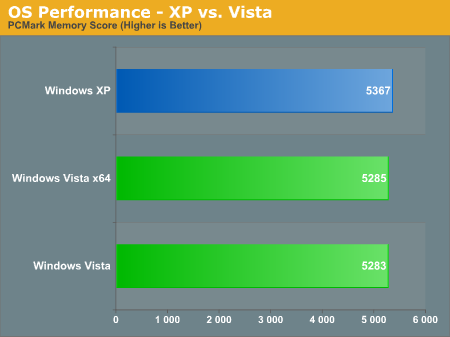
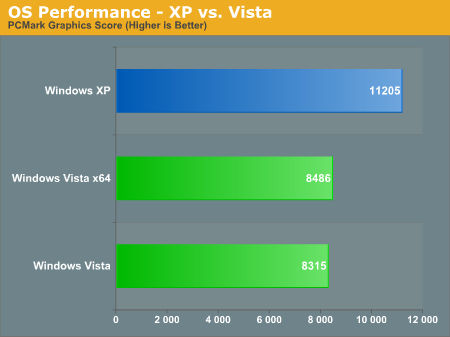
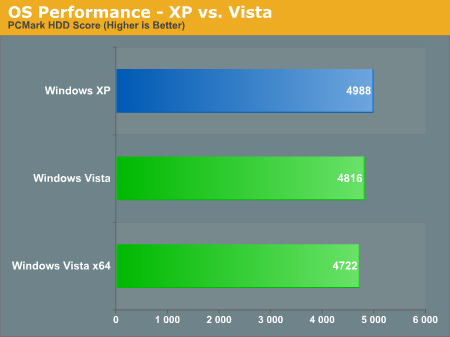
Performance under PCMark is fairly close between Vista and XP, with XP generally holding on to a 1% - 4% performance advantage in most of the categories. The only exception to the rule is the graphics score of PCMark which has XP at around 35% ahead of Vista, but we'll address graphics performance shortcomings of Vista later in the article.
The difference between the 32-bit and 64-bit versions of Vista are hardly pronounced, with the two being evenly matched across the board. Once again, remember that PCMark is a 32-bit benchmark so it is running in Windows on Windows (WOW64) mode. That it can remain competitive is good news, but whether that's because WOW64 works well in all cases or it is merely optimized for PCMark05 remains to be seen.
3DMark '06 Performance
We chose to include 3DMark '06 performance here instead of with our game tests to look at the gaming performance of Vista on a system level rather than a GPU level:
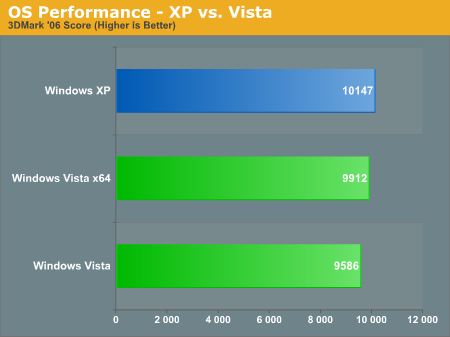
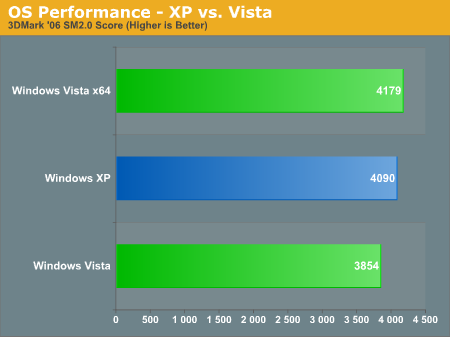
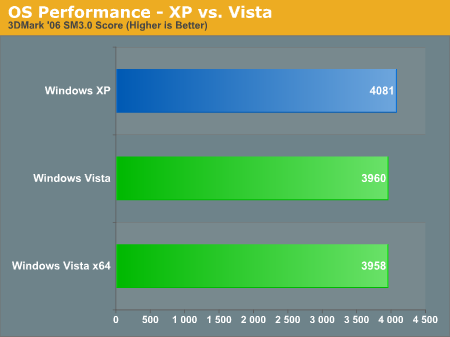
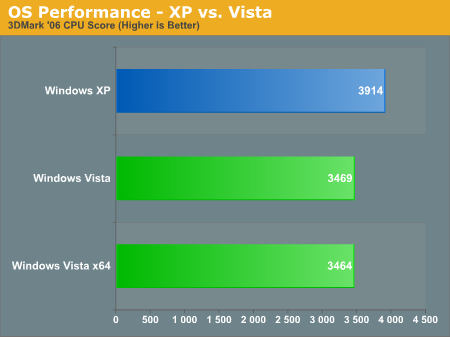
Overall XP is about 6% faster than Vista, although the 3DMark06 CPU score is nearly 13% higher on XP than it is on Vista. As a 32-bit benchmark, it's once again good to see no negative performance difference between the Vista x86 and x64 versions.
Benchmarking in Vista is an extremely difficult task, thanks to features like SuperFetch designed to improve performance at the sacrifice of repeatability. We're in love with SuperFetch as a feature, but it does make our jobs a bit more difficult as we have to be very mindful of what has been cached into main memory and how that impacts the performance of our benchmarks. Testing difficulties under Vista are compounded by the fact that our major test suites don't work under the new OS. SYSMark and PC WorldBench simply won't run and thus we have to rely on individual application tests and home-brew scripts to measure performance.
Our goal for this article was to find out if Windows Vista, on modern day hardware, continues to be slower than Windows XP as it has been in previous beta and RC versions. The secondary goal is to look at x64 performance to see if it too has changed behavior, to the point where you no longer need to worry about losing 32-bit performance if you move to the 64-bit version of Vista. We ran a handful of application tests to compare the three OSes (XP, Vista and Vista x64), and later on we'll focus on gaming tests as well to showcase graphics performance.
PCMark '05 Performance
Despite looking quite synthetic, PCMark has grown into a nice lightweight alternative to the big application suite benchmarks like SYSMark. It was also one of the first benchmarks to get official Vista support, although it remains a 32-bit only test.





Performance under PCMark is fairly close between Vista and XP, with XP generally holding on to a 1% - 4% performance advantage in most of the categories. The only exception to the rule is the graphics score of PCMark which has XP at around 35% ahead of Vista, but we'll address graphics performance shortcomings of Vista later in the article.
The difference between the 32-bit and 64-bit versions of Vista are hardly pronounced, with the two being evenly matched across the board. Once again, remember that PCMark is a 32-bit benchmark so it is running in Windows on Windows (WOW64) mode. That it can remain competitive is good news, but whether that's because WOW64 works well in all cases or it is merely optimized for PCMark05 remains to be seen.
3DMark '06 Performance
We chose to include 3DMark '06 performance here instead of with our game tests to look at the gaming performance of Vista on a system level rather than a GPU level:




Overall XP is about 6% faster than Vista, although the 3DMark06 CPU score is nearly 13% higher on XP than it is on Vista. As a 32-bit benchmark, it's once again good to see no negative performance difference between the Vista x86 and x64 versions.










105 Comments
View All Comments
haplo602 - Monday, February 5, 2007 - link
Yes I am biased. I am fed up with MS. All the delay was for what purpose ?Yes please, point me to the documentation, I'd be glad to learn something.
vailr - Thursday, February 1, 2007 - link
A quick look on Newegg shows the least expensive DX 10 cards (all NVIDIA 8800 based) are priced around $400. When can we expect to see DX 10 cards costing: <$200?Brazos - Friday, February 2, 2007 - link
I believe that Nvidia is releasing a broader range of directx 10 gpu's in March. They're supposed to be for the low - mid range video cards.PrinceGaz - Thursday, February 1, 2007 - link
Vista Enterprise/VLK also includes BitLocker, it is not a feature unique to Ultimate Edition, but like you say it requires a TPM to be used and if I had a TPM on my mobo, I certainly wouldn't have the hateful chip enabled.
Before you say that Vista Enterprise is not a copy that any of us are likely to personally choose, because unlike XP it still requires activation, bear in mind that Enterprise edition activation is rather different from other versions and likely to be the first that is cracked indefinitely. Given that you also recommended Vista Business as the preferred version of Vista for experienced users unwilling to pay the extra for Ultimate, that makes Enterprise even more viable as it includes a superset of Vista Business features and the only things it is missing from Ultimate are a few entertainment oriented apps that no one will miss. That's not to say I condone unlicensed use of Vista Enterprise, I'd never say anything like that here, but I think the use of it may be a lot more prelavent than the article suggests.
stash - Friday, February 2, 2007 - link
BitLocker does NOT require a TPM chip. It can also use a usb flash drive to store the key material.
Ryan Smith - Saturday, February 3, 2007 - link
BitLocker requires a TPM chip. This confused us at first too when we were working on the article, but the documentation in Vista for BitLocker clearly states a TPM chip is required. If it's a 1.2 chip or higher the key is stored on the chip, otherwise it's stored on the flash drive.If it was possible to use BitLocker without a TPM chip, we would have more than likely thrown in some BitLocker benchmarks.
mlambert890 - Saturday, February 3, 2007 - link
You're wrong Ryan. BitLocker does NOT require TPM chip. You can store the decrypt AND recovery keys on a USB FOB. Just go here and read scenario 3:http://technet2.microsoft.com/WindowsVista/en/libr...">http://technet2.microsoft.com/WindowsVi...57-b031-...
Ryan Smith - Saturday, February 3, 2007 - link
Interesting; we looked for something like this when we were doing the prep for this article and came up empty-handed. It's nice to see it's there, though I'm not sure for the reason on why MS would go out of their way to disable this option and not leave any instructions in the Vista help on how to enable it. Thanks for the link.stash - Saturday, February 3, 2007 - link
Couple of reasons:First, it is a hell of a lot more secure to use a TPM to store key material than a USB flash drive. A TPM is essentially a smartcard soldered directly to your motherboard. It is physically and logically tamper-resistant.
Secondly, BitLocker will only do repudiation checks of the system files with a TPM. When using a TPM. the hashes of certain system files are stored in the TPM. On boot, they are compared and if they have been changed, the user will be notified.
So, are you going to answer my question about which common 3rd party apps require admin rights to work properly? Cause right now, my impression of that comment is that it is pure FUD.
LoneWolf15 - Friday, February 2, 2007 - link
I was concerned about this too, but my new issue of MaximumPC shows how to use Vista's BitLocker without a TPM.Instead of the TPM holding the security key, you need a thumbdrive to do it instead. Doesn't require a high-capacity one, so any cheapie should do (though I'd choose one with a somewhat bulletproof casing to ensure you never break it and end up screwed).